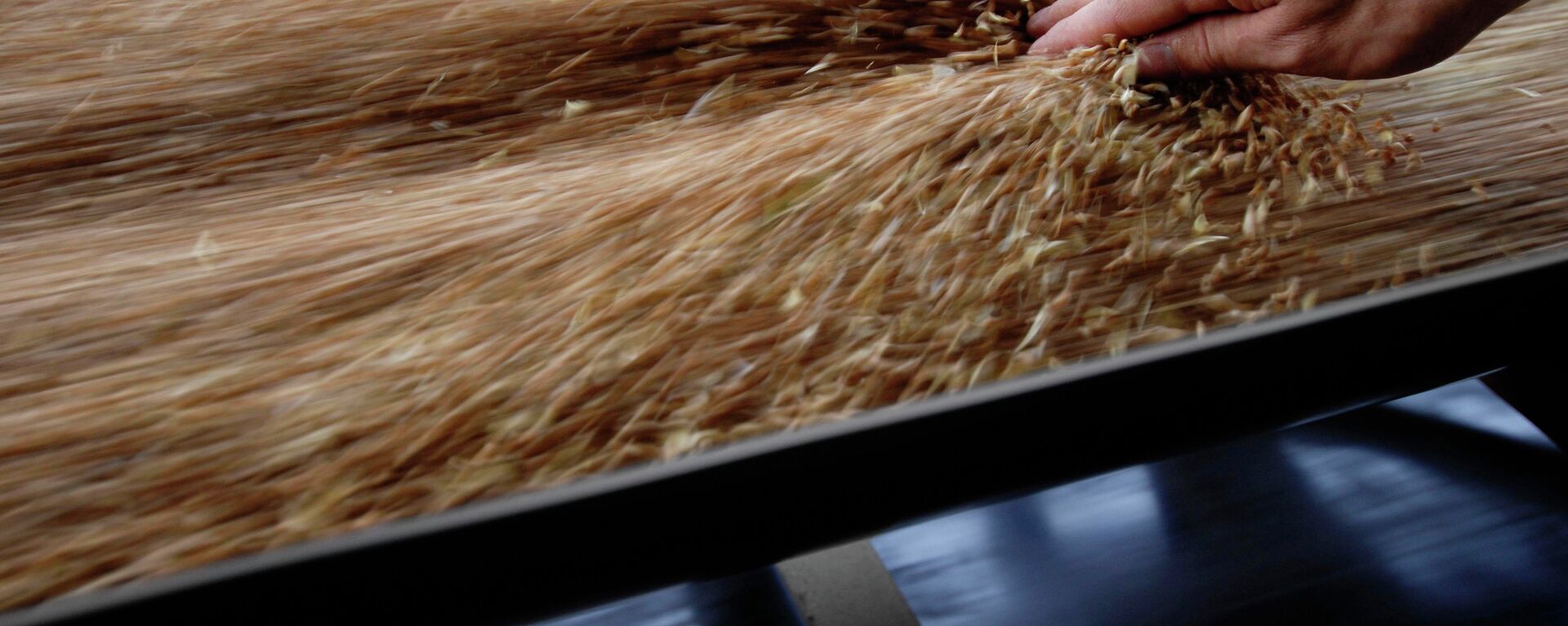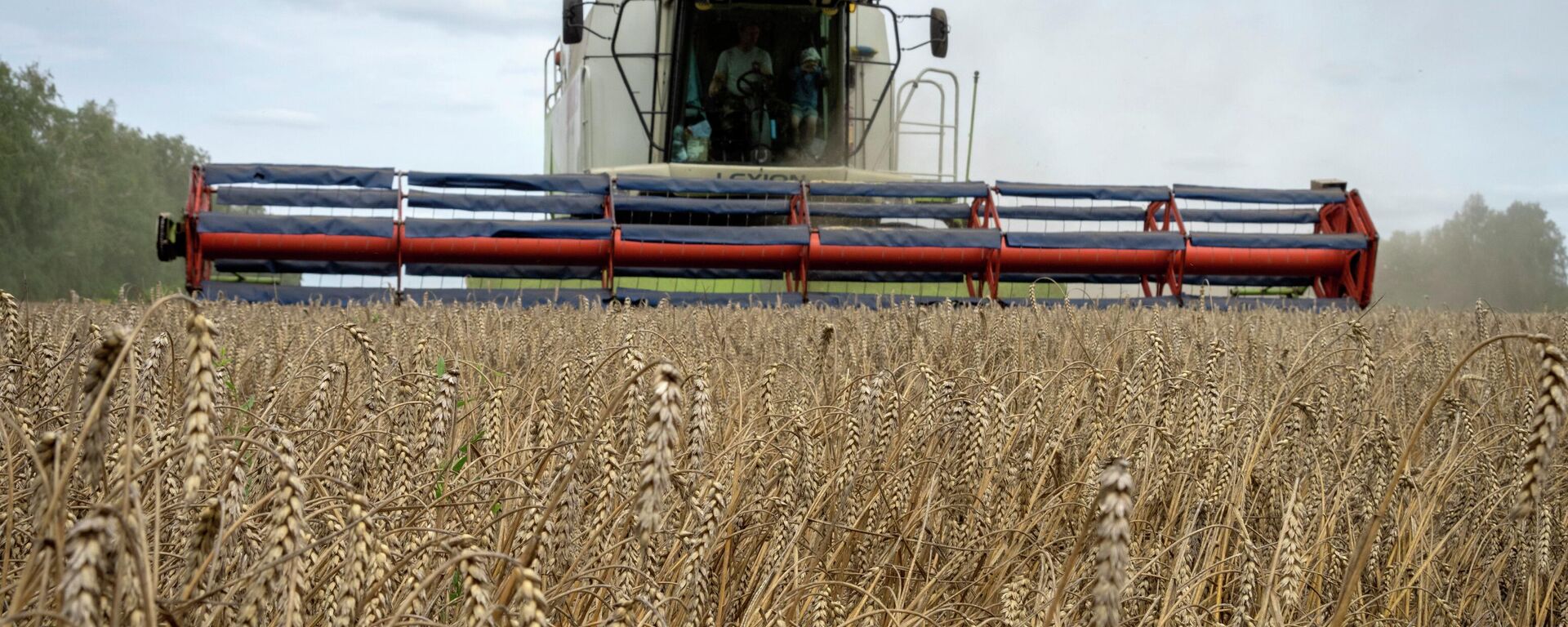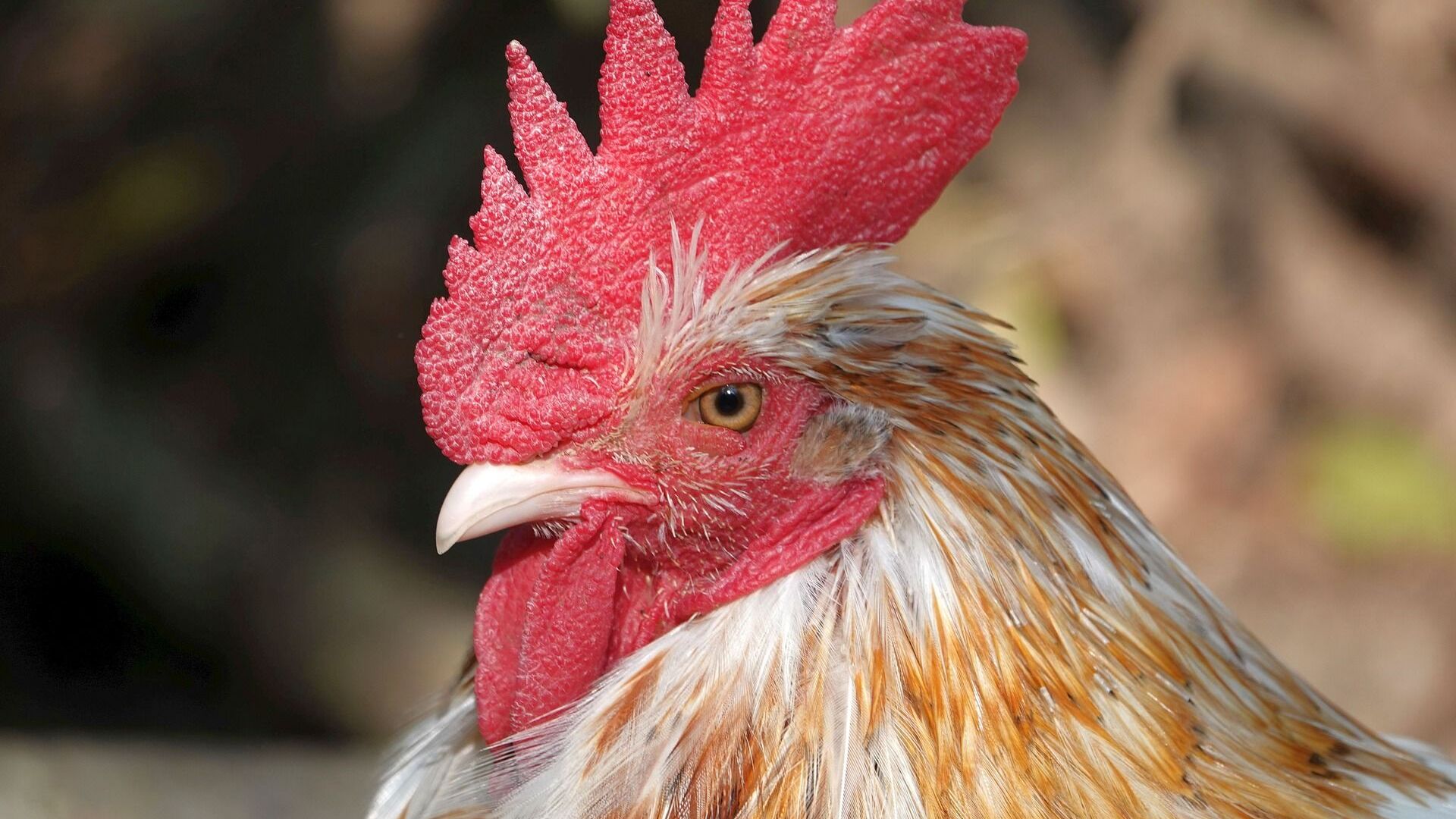https://sputnikglobe.com/20230919/cheap-ukrainian-poultry-imports-ruffle-french-farmers-feathers-1113490194.html
Cheap Ukrainian Poultry Imports Ruffle French Farmers’ Feathers
Cheap Ukrainian Poultry Imports Ruffle French Farmers’ Feathers
Sputnik International
Ukraine has filed a formal complaint with the World Trade Organization over unilateral moves by Hungary, Poland and Slovakia to ban the import of low-cost Ukrainian foodstuffs in an effort to protect local farmers. Further westward in Europe, farmers in France are bracing for losses resulting from grey imports of Ukrainian poultry.
2023-09-19T11:55+0000
2023-09-19T11:55+0000
2023-09-19T11:55+0000
economy
ukraine
france
world trade organization (wto)
european union (eu)
european commission
chicken
poultry
imports
restrictions
https://cdn1.img.sputnikglobe.com/img/107737/83/1077378399_0:100:1920:1180_1920x0_80_0_0_eb672b54a0b22372376951f598449399.jpg
French poultry breeders have sounded the alarm over what they say is a sharp jump in the import of Ukrainian chicken to France, warning that the low-cost competition, often coming in the form of grey imports through third countries, could put them out of business.According to French customs data, imports of Ukrainian poultry over the first half of 2023 increased by a whopping 75 percent. And while this number still accounts for less than one percent of total imports, Anvol, a group representing France’s farmers, says the real figures are far higher, since imported Ukrainian poultry often makes its way to France through factories in Belgium, the Netherlands, and Poland, and is not labeled as coming from Ukraine. The figures “do not reflect reality,” Yann Nedelec, Anvol’s director, told local media.The European Commission says Ukrainian chicken accounted for 27 percent of the total volume of the EU’s poultry imports over the first five months of 2023, second only behind Brazil (36 percent) and above Thailand (19 percent). That’s far above the 13 percent of imports Ukraine accounted for just two years ago in 2021.Ukraine’s pro-Western elites thought they had won a major victory in 2014 after the success of the Euromaidan coup d’état and the signing of the European Association Agreement, expecting the deal to facilitate the export of Ukrainian foodstuffs to European markets. These expectations did not come to pass, with the European Union instead tightening up protectionist measures against Ukraine.It would not be until May 2022, after the escalation of the smoldering Donbass crisis into a full-blown NATO-Russia proxy war, that Brussels would suspend customs duties on Kiev, ostensibly to support the country’s economy.Paul-Henri Lava, a representative of the Brussels-based lobbying group AVEC Poultry, told media that the problem with Ukrainian poultry is that it is not subject to quotas, allowing for large-scale imports, mainly of chicken fillet, “dragging down the prices of this most profitable part of the animal” for local producers. At the same time, thanks to Ukraine’s geographic proximity, it can export fresh, not frozen, chicken, which again puts its exports in direct competition with French farmers.Ukraine insists its poultry products are “certified by European institutions,” and that the current “simplified trade regime’” is “an extremely important tool” helping Ukrainian farmers to “survive economically” amid plunging demand at home after some eight million people left the country.But according to Anvol’s information, the largest Ukrainian exporter, accounting for over 60 percent of all exports, is a company called MHP, which is actually registered in Cyprus, listed in London, and controlled by a Ukrainian oligarch.Imports have slowly chipped away at French poultry farmers’ ability to make ends meet for years now, creeping up from 41 percent in 2020, to 45 percent in 2021, and topping 50.5 percent in 2022. Over the long term, defenders of French agriculture fear that the situation threatens to result in the disappearance of French producers, the deterioration of the country’s balance of trade, and greater dependence on foreign countries for food.But French Minister of Agriculture Marc Fesneau has so far ignored complaints, expressing solidarity with Kiev and saying last week that he doesn’t want to “send hostile signals” in Ukraine’s direction. Fesneau added that he would investigate whether the suspension of customs duties “destabilizes the market or not” before “taking a definitive position.”Brussels announced last Friday that it would not extend restrictions on the import of Ukrainian foodstuffs including wheat, maize, rapeseed, and sunflower seeds into the EU, and asked Kiev to self-regulate export control measures. Authorities in Hungary, Poland, and Slovakia responded by "taking a definitive position" to extend restrictions on Ukrainian foodstuffs on a unilateral basis, and listed 24 food products among the banned goods – including grains, but also poultry, eggs, meats, honey, vegetables, and wine.Kiev responded by filing a complaint against the three countries with the World Trade Organization, and threatened with bans on goods from Poland and Hungary on Tuesday unless the “unfriendly actions” were immediately reversed.“It is fundamentally important for us to prove that individual member states cannot ban the import of Ukrainian goods,” Ukrainian Economy Minister Yuliya Svyridenko said while announcing Kiev’s WTO complaint. Ukraine hopes “that these states will lift their restrictions and we will not have to clarify the relationship in the courts for a long time,” she said.
https://sputnikglobe.com/20230918/ukraine-files-import-ban-lawsuits-against-poland-hungary-slovakia-with-wto-1113471832.html
https://sputnikglobe.com/20230918/ukraine-grain-row-shows-war-fatigue-seeping-in-as-eu-has-own-interests-at-stake-1113457047.html
ukraine
france
Sputnik International
feedback@sputniknews.com
+74956456601
MIA „Rossiya Segodnya“
2023
News
en_EN
Sputnik International
feedback@sputniknews.com
+74956456601
MIA „Rossiya Segodnya“
Sputnik International
feedback@sputniknews.com
+74956456601
MIA „Rossiya Segodnya“
ukraine, france, poultry, chicken, imports, exports, dispute, farmers, undercutting, prices, cost
ukraine, france, poultry, chicken, imports, exports, dispute, farmers, undercutting, prices, cost
Cheap Ukrainian Poultry Imports Ruffle French Farmers’ Feathers
Ukraine has filed a formal complaint with the World Trade Organization over unilateral moves by Hungary, Poland, and Slovakia to ban the import of low-cost Ukrainian foodstuffs in an effort to protect local farmers. Further westward in Europe, farmers in France are bracing for losses resulting from grey imports of Ukrainian poultry.
French poultry breeders have sounded the alarm over what they say is a sharp jump in the import of Ukrainian chicken to France, warning that the low-cost competition, often coming in the form of grey imports through third countries, could put them out of business.
According to French customs data, imports of Ukrainian poultry over the first half of 2023 increased by a whopping 75 percent. And while this number still accounts for less than one percent of total imports, Anvol, a group representing France’s farmers, says the real figures are far higher, since imported Ukrainian poultry often makes its way to France through factories in Belgium, the Netherlands, and Poland, and is not labeled as coming from Ukraine.
The figures “do not reflect reality,” Yann Nedelec, Anvol’s director, told local media.The European Commission says Ukrainian chicken accounted for 27 percent of the total volume of the EU’s poultry imports over the first five months of 2023, second only behind Brazil (36 percent) and above Thailand (19 percent). That’s far above the 13 percent of imports Ukraine accounted for just two years ago in 2021.

18 September 2023, 16:57 GMT
Ukraine’s pro-Western elites thought they had won a major victory in 2014 after the success of the Euromaidan coup d’état and the signing of the European Association Agreement, expecting the deal to facilitate the export of Ukrainian foodstuffs to European markets. These expectations did not come to pass, with the European Union instead tightening up protectionist measures against Ukraine.
It would not be until May 2022, after the escalation of the smoldering Donbass crisis into a full-blown NATO-Russia proxy war, that Brussels would suspend customs duties on Kiev, ostensibly to support the country’s economy.
Paul-Henri Lava, a representative of the Brussels-based lobbying group AVEC Poultry, told media that the problem with Ukrainian poultry is that it is not subject to quotas, allowing for large-scale imports, mainly of chicken fillet, “dragging down the prices of this most profitable part of the animal” for local producers. At the same time, thanks to Ukraine’s geographic proximity, it can export fresh, not frozen, chicken, which again puts its exports in direct competition with French farmers.
On top of that, Mr. Lava complained, unfair competition from Ukraine is coming “at a time when the European Commission is telling us that we must reduce the size of farms and move toward short supply chains.” AVEC Poultry isn’t seeking to ban Ukrainian poultry imports, but they should remain “at an acceptable level,” Lava urged.
Ukraine insists its poultry products are “certified by European institutions,” and that the current “simplified trade regime’” is “an extremely important tool” helping Ukrainian farmers to “survive economically” amid plunging demand at home after some eight million people left the country.
But according to Anvol’s information, the largest Ukrainian exporter, accounting for over 60 percent of all exports, is a company called MHP, which is actually registered in Cyprus, listed in London, and controlled by a Ukrainian oligarch.
Imports have slowly chipped away at French poultry farmers’ ability to make ends meet for years now, creeping up from 41 percent in 2020, to 45 percent in 2021, and topping 50.5 percent in 2022. Over the long term, defenders of French agriculture
fear that the situation threatens to result in the disappearance of French producers, the deterioration of the country’s balance of trade, and greater dependence on foreign countries for food.

18 September 2023, 16:22 GMT
But French Minister of Agriculture Marc Fesneau has so far ignored complaints,
expressing solidarity with Kiev and saying last week that he doesn’t want to “send hostile signals” in Ukraine’s direction. Fesneau added that he would investigate whether the suspension of customs duties “destabilizes the market or not” before “taking a definitive position.”
Brussels announced last Friday that it would not extend restrictions on the import of Ukrainian foodstuffs including wheat, maize, rapeseed, and sunflower seeds into the EU, and asked Kiev to self-regulate export control measures. Authorities in Hungary, Poland, and Slovakia responded by "taking a definitive position" to extend restrictions on Ukrainian foodstuffs on a unilateral basis, and listed 24 food products among the banned goods – including grains, but also poultry, eggs, meats, honey, vegetables, and wine.
Kiev responded by filing a complaint against the three countries with the World Trade Organization, and threatened with bans on goods from Poland and Hungary on Tuesday unless the “unfriendly actions” were immediately reversed.
“It is fundamentally important for us to prove that individual member states cannot ban the import of Ukrainian goods,” Ukrainian Economy Minister Yuliya Svyridenko said while announcing Kiev’s WTO complaint. Ukraine hopes “that these states will lift their restrictions and we will not have to clarify the relationship in the courts for a long time,” she said.




